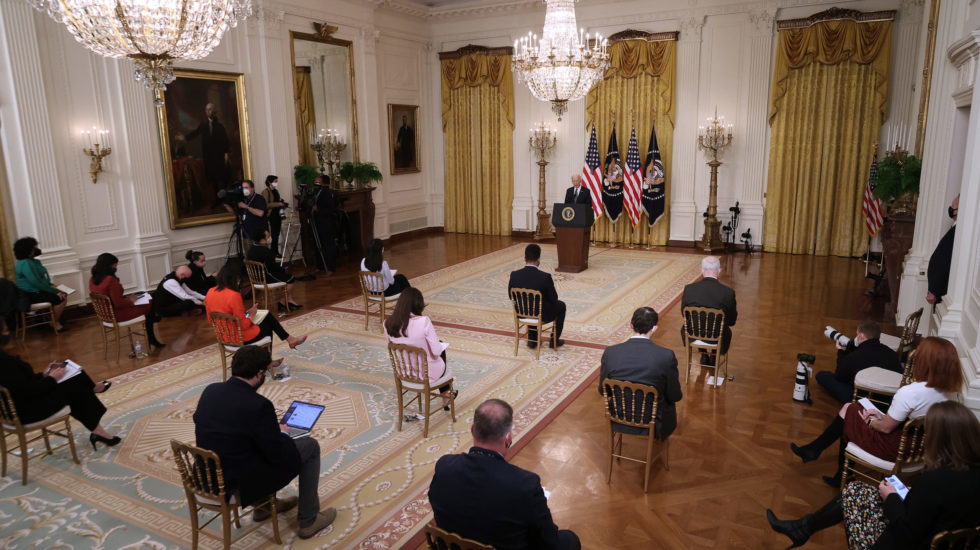The first press conference of Joe Biden’s presidency lasted 62 minutes, and it took less than half that time to confirm some people’s fears that the Washington press corps remains woefully out of touch with the American people and what matters to them. Washington Post media columnist Margaret Sullivan summed it up rather succinctly.
During the eagerly awaited presser, Biden was asked about the situation at the border, congressional gridlock and the filibuster, voting rights, gun control and even, incredibly, the 2024 election (two months after he was inaugurated). But somehow, the assembled press corps that had complained for weeks about the president not holding a formal press conference, did not inquire about the two topics that are very likely at the top of most Americans’ list of priorities: The pandemic and the economy.
How is that possible? Biden even began the presser by setting a new, more ambitious goal for vaccinations.
Despite this, none of the 25 assembled reporters thought it important enough to ask the president about his administration’s plans to continue to fight COVID-19. It’s as if the reporters in the room believed that the pandemic is over and not worth talking about anymore.
“If you do run, will Vice President Harris be on your ticket?” — Kaitlan Collins pic.twitter.com/8ahdJC06xF
— Aaron Rupar (@atrupar) March 25, 2021
Overall, the entire proceeding showed a stunning lack of awareness by the media on hand about what is foremost on the minds of the American people.
So issue number one and issue number two for the public in every poll and… they just don’t come up?
I get that reporters prioritize their personal interests and what they think will make news, but this is pretty out of touch.https://t.co/nK0y3YudJH
— Matthew Gertz (@MattGertz) March 25, 2021
Then there was the filibuster, which was brought up by several reporters.
The filibuster is the definition of political “inside baseball.”
It’s an arcane senatorial procedure that we’d wager a sizable amount on, that less than half of the country knows about or loses sleep over. It’s a topic better suited for the Sunday morning political talk shows. Asking the president about it without the proper context of how it impacts the average family is pointless.
A popular criticism of the reporters who cover the White House is that they tend to be political animals who are too close to see when they get lost in the weeds. Today they showed why that’s a common complaint.
Could it be that the White House press corps, in its desire to show that they were going to be as tough on Biden as they were on Trump, lost sight of what their true objective should be? Perhaps.
That objective, by the way, should be about holding the president and his administration accountable. And several reporters, notably PBS NewsHour’s Yamiche Alcindor, Univision’s Janet Rodriguez and ABC News’ Cecilia Vega, did just that by sharply questioning Biden about the growing mess at the border.
Biden says current conditions at camps housing unaccompanied children on the border are “totally unacceptable” and that new facilities are becoming available pic.twitter.com/mqZNXXtmFR
— Aaron Rupar (@atrupar) March 25, 2021
But too many of their colleagues appeared to be grandstanding and looking for their on-camera “gotcha” moment. GQ Magazine’s Julia Ioffe raised a good point about these press conferences in today’s hyper-aggressive news environment.
Dan Rather offered his own analysis on how this initial Biden press conference went in his Steady newsletter. We think it rightly sums up the day.
“I am loath to pass judgement on any one reporter. There are a lot of complicated factors that go into drawing up your question. You want to have the president say something substantive. You hopefully make some news. You want to expand the spectrum of topics under public discussion. But I couldn’t help but think how less interesting and less impactful this press conference was from previous Biden town halls. These questions today were not the questions that nurses in ERs care about, or teachers worrying about going back into the classroom, or single moms juggling childcare and doctor’s bills. These were not the questions that those who are worried about a more active wildfire season, or student debt, or historical injustices around race care about.”
“The president should be pressed on the concerns of the people, and that means talking to the people, all across the country. From the South Bronx to the reservations of Arizona, from the old steel towns of the Midwest to the tech communities along the Pacific, from Black farmers to immigrant shopkeepers, from every corner and demographic of this great nation, people are facing challenges, and worries, and insecurities. They have questions that deserve answers and the president should have to speak to them. Today, it seemed he was mainly being asked to speak to the bookers on cable news. “
